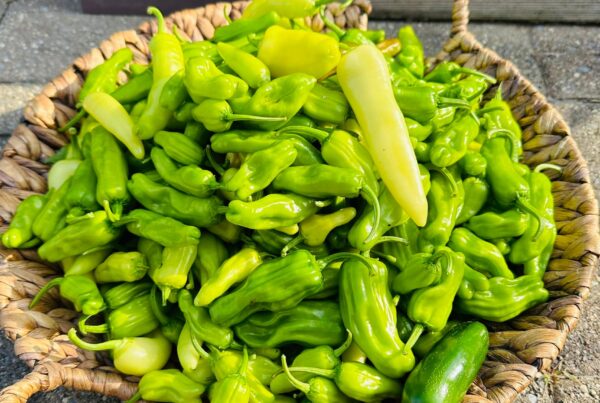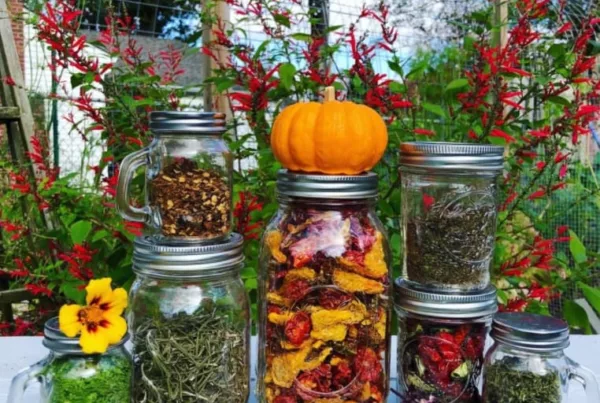Written by Chris McLaughlin
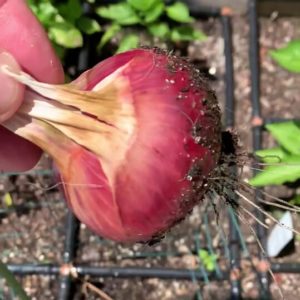 Some vegetables are great candidates for long term storage just as they are? Let’s start with potatoes, onions, and winter squash, all of which will stay good for months, if you store them properly. Here’s how to do it:
Some vegetables are great candidates for long term storage just as they are? Let’s start with potatoes, onions, and winter squash, all of which will stay good for months, if you store them properly. Here’s how to do it:
Step 1: Don’t Wash (Seriously)
Don’t wash squash, potatoes or onions, gardeners! As you harvest, keep that in mind along with these pointers for successful long-term storage.
- Harvest fully mature vegetables.
- Handle your crops gently. (No pitching them from your garden bed into a basket 10 yards away.)
- Give ‘em room while you harvest. Use several shallow containers as you collect your bounty, versus piling them on top of each other.
- Gently brush off your vegetables instead of washing or rinsing them.
- ‘Cure’ the appropriate crops. Curing is just another way of saying ‘prepare them for storage.’ (NOTE: Not all crops require curing.)
Step 2: Cure and Store
Potato Prep and Storage
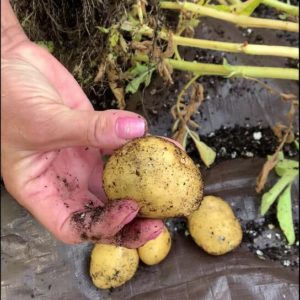 Cure: Begin preparing your potatoes by not watering the plants the last two weeks before harvesting. This helps toughen them up for storage later. Let the vines die back completely before collecting the tubers. Gently brush soil from the potatoes and avoid washing or rinsing. Place completely dry potatoes in a dark, dry area with high humidity (85-90%) for a week. Measure your humidity with an inexpensive gauge, available online for under $20.
Cure: Begin preparing your potatoes by not watering the plants the last two weeks before harvesting. This helps toughen them up for storage later. Let the vines die back completely before collecting the tubers. Gently brush soil from the potatoes and avoid washing or rinsing. Place completely dry potatoes in a dark, dry area with high humidity (85-90%) for a week. Measure your humidity with an inexpensive gauge, available online for under $20.
Store: Keep potatoes in a dark, well-ventilated area around 45-55 degrees. They like a bit of humidity (lower than the cure stage) versus a bone-dry environment, if that’s possible where you live.
Onion Prep and Storage
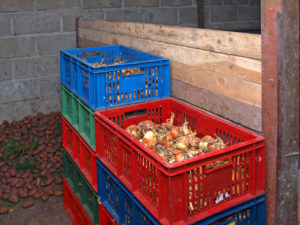
One way to store onions? Crates with newspaper layers for circulation.
Cure: Brush off soil and debris from the bulbs and leave onion roots intact. Cut the dead tops from the onions leaving a 1” stem on top. Place them in a warm, dry, well-ventilated area for three weeks. Spread them out on newspaper so that the bulbs aren’t touching. The goal is to toughen up the outer skins without losing the moisture on the inside of the bulb.
Store: Keep onions in a well-ventilated area at 56-76% humidity (ideal) and between 45-55 degrees. Place them in hanging mesh bags, wooden or plastic open crates, or a cardboard box with ventilation holes poked into all sides of the box. Any onions that get a soft spot or look like they are going to sprout should be used immediately.
Winter Squash (But Not Acorn Squash)
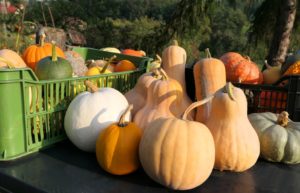
There are many winter squash varieties you can grow vertically in your SFG.
Cure: While harvesting, brush soil off and leave a 1-inch stem on each fruit. Winter squash can be cured before storing, except for acorn squash. Why? The high temps and humidity of curing reduces the storage life of acorn squashes. Cure Butternut squash, Hubbard, spaghetti squash, Delicata and other winter squashes in a warm well-ventilated area for 10 days to harden the shell and heal any cuts (80-85% humidity is ideal).
Store: Keep winter squashes (and this does include acorn squash) stored in dark, well-ventilated areas that are 50-55 degrees and about 75% humidity. How long they last in storage depends on the variety.
Four Storage Tips for Potatoes, Onions, and Winter Squash
- Give your stored veggies good air circulation. One of the best ways to do this is to NOT stack them. Moisture-rich root crops like onions and potatoes can spoil the entire harvest quickly if one starts to rot.
- The best storage temperatures are between 45-55 degrees. (Below 60 degrees, but above freezing.)
- Don’t be tempted to store diseased veggies with your healthy ones. This is the quickest way to lose a whole season’s crop.
- Avoid storing these vegetables near fruit. Ripening fruit produces ethylene gas which will make potatoes and squash over-ripen too quickly.
Remember – don’t let less-than-perfect temperatures or humidity stop you from storing your home-grown onions, potatoes, and winter squash. Your basement or a cool corner of the garage will do just fine. Here’s to delicious eating all winter long!

